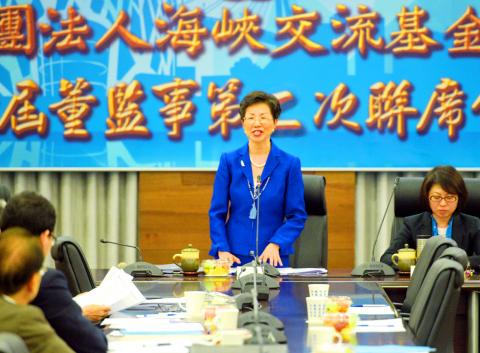Former Mainland Affairs Council (MAC) minister Katharine Chang (張小月) yesterday took the helm of the semi-official Straits Exchange Foundation (SEF), saying that she hopes to meet with the chairman of China’s Association for Relations Across the Taiwan Straits (ARATS).
Chang, a senior diplomat who led the council since President Tsai Ing-wen’s (蔡英文) inauguration in May 2016, was elected by the foundation’s board of directors and supervisors at a meeting yesterday afternoon, after being picked by the Tsai administration to succeed former SEF chairman Tien Hung-mao (田弘茂).
On Feb. 26, Chang was replaced at the council by National Taiwan University Graduate Institute of National Development professor Chen Ming-tong (陳明通) in a Cabinet reshuffle.

Photo: Chang Chia-ming, Taipei Times
“Exchanges between both sides of the Taiwan Strait should be based on mutual respect, as well as the principle of seeking common ground, while reserving our differences,” Chang said when asked by the media whether she would inherit Tien’s unfulfilled goal of meeting ARATS Chairman Chen Deming (陳德銘) in Kinmen.
Such a meeting could be held anywhere, as long as it is conducted in a fair, equal and respectful manner, she said.
The last meeting between leaders of the two semi-official organizations was in November 2015 in Taipei between Chen Deming and then-SEF chairman Lin Join-sane (林中森).
Communications between the two agencies have been cut since Tsai took office due to her administration’s refusal to recognize Beijing’s “one China” principle.
There is more China could do than simply granting Lee Ching-yu (李凈瑜), the wife of imprisoned Taiwanese human rights advocate Lee Ming-che (李明哲), a visit to her husband in prison, Chang said.
“How can a small nation like Taiwan tolerate people who have vastly different ideas, but a large country like China cannot stomach even one individual like Lee [Ming-che]?” Chang said, reiterating the government’s oft-stated hope that Lee Ming-che will be released as soon as possible.
Following a number of failed attempts to fly to China to visit her husband in Chishan Prison in Hunan Province, Lee Ching-yu on Monday received a one-off document allowing her to enter China.
Lee Ming-che was on Nov. 28 last year sentenced to five years in prison and deprived of his political rights for a further two years by a Chinese court on charges of subverting state power.
The ruling came eight months after he was detained by Chinese authorities.
Although Chang’s position descended from the head of the government’s primary cross-strait policymaking agency to the leader of a foundation charged with carrying out policies, she said that what matters is not the level of her post, but the opportunity to contribute to furthering cross-strait ties.
“Although my jobs are in different locations, the work is all the same,” she said.

A preclearance service to facilitate entry for people traveling to select airports in Japan would be available from Thursday next week to Feb. 25 at Taiwan Taoyuan International Airport, Taoyuan International Airport Corp (TIAC) said on Tuesday. The service was first made available to Taiwanese travelers throughout the winter vacation of 2024 and during the Lunar New Year holiday. In addition to flights to the Japanese cities of Hakodate, Asahikawa, Akita, Sendai, Niigata, Okayama, Takamatsu, Kumamoto and Kagoshima, the service would be available to travelers to Kobe and Oita. The service can be accessed by passengers of 15 flight routes operated by

GIVE AND TAKE: Blood demand continues to rise each year, while fewer young donors are available due to the nation’s falling birthrate, a doctor said Blood donors can redeem points earned from donations to obtain limited edition Formosan black bear travel mugs, the Kaohsiung Blood Center said yesterday, as it announced a goal of stocking 20,000 units of blood prior to the Lunar New Year. The last month of the lunar year is National Blood Donation Month, when local centers seek to stockpile blood for use during the Lunar New Year holiday. The blood demand in southern Taiwan — including Tainan and Kaohsiung, as well as Chiayi, Pingtung, Penghu and Taitung counties — is about 2,000 units per day, the center said. The donation campaign aims to boost

ENHANCING EFFICIENCY: The apron can accommodate 16 airplanes overnight at Taoyuan airport while work on the third runway continues, the transport minister said A new temporary overnight parking apron at Taiwan Taoyuan International Airport is to start operating on Friday next week to boost operational efficiency while the third runway is being constructed, the Ministry of Transportation and Communications said yesterday. The apron — one of the crucial projects in the construction of the third runway — can accommodate 16 aircraft overnight at the nation’s largest international airport, Minister of Transportation and Communications Chen Shih-kai (陳世凱) told reporters while inspecting the new facility yesterday morning. Aside from providing the airport operator with greater flexibility in aircraft parking during the third runway construction,

American climber Alex Honnold is to attempt a free climb of Taipei 101 today at 9am, with traffic closures around the skyscraper. To accommodate the climb attempt and filming, the Taipei Department of Transportation said traffic controls would be enforced around the Taipei 101 area. If weather conditions delay the climb, the restrictions would be pushed back to tomorrow. Traffic controls would be in place today from 7am to 11am around the Taipei 101 area, the department said. Songzhi Road would be fully closed in both directions between Songlian Road and Xinyi Road Sec 5, it said, adding that bidirectional traffic controls would